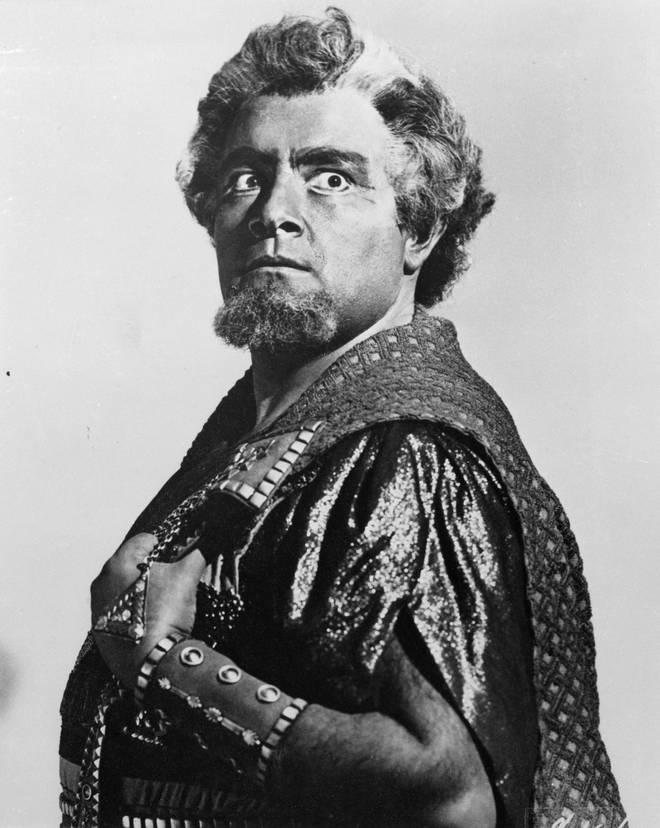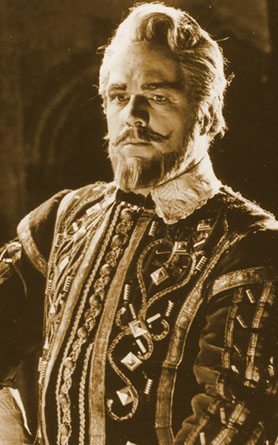|
SATURDEE OPRY LINKS 27:
Baritone Special!
 
Leonard Warren, whose voice "filled the stage like black smoke," according to
opera aficianado Tony Randall, and the great Met veteran, Louis Quilico.
Saturdee Opry Links Overture!
"Don Carlos," by Verdi.
https://www.youtube.com/watch?v=W7UByIT8bSw&fbclid=IwAR1iKBy4WMLX-9D_KcQQPZrJRjuf0K3kf_VMW_JLgwlEKALjOXqDM8yPWNo
1.
To set the tone for today---baritone, that is---here is a young Dimitri
Hvorostovsky. Russian meddling of the best order. This is the opening monologue
from "Il Pagliacci," by Leoncavallo. You don't know it, you say? Ah, but you
do---at least you know this opera. It's the one where the tenor is getting
dressed as a clown, and weeps as he sings. Right, I knew you knew it. This is
"Si Puo," in which Tonio, member of a traveling show, steps out in front of the
curtain (apparently in the middle of the overture) to explain why the composer
wrote the opera as he did. He then goes on to say that the drama that the
audience will view is not merely a play, but a real story. You know, just like
life.
https://www.youtube.com/watch?v=aa9yJ1hefX8
Translation:
https://opera-cat.livejournal.com/9666.html
2.
Here is a delicate, if anything sung in German may be described as delicate,
paean to love, by Wagner. Yes, Wagner. As I frequently point out here, Wagner's
operas are all about love as the be-all, end-all of. . .everything. (Don't
believe it? Listen to the great conductor and musicologist, James Conlon, talk
about it here:
https://www.youtube.com/watch?v=9_jRNqhJU-M.
This is "Blick ich
umher in diesem edlen Kreise," ("When I cast my eyes around this noble circle")
from "Tannhauser," as sung wonderfully by Finnish baritone Tommi Hakala, about
whom there is very little information on-line.
https://www.youtube.com/watch?time_continue=15&v=ItNS3NxB_08
Translation: (search for "Blick ich")
http://www.murashev.com/opera/Tannh%C3%A4user_libretto_English_German
3.
It's tempting, when surveying baritones, to post only the late Dmitri
Hvorostovksy, so winning is his voice, presence. But we are resisting temptation
and instead are posting one Gino Quilico, here in a fine performance of
Valentin's noble aria from Gounod's "Faust." What? The name, Quilico, sounds
familiar? Wasn't there a legendary baritone named Louis Quilico? Yes, and Gino
is his son.
Setting: A celebration in a public square in a German city, 16th century
Synopsis: Valentin has been called off to war. He is not worried about what will
happen to him because of the sacred medallion that he has been given. He is,
however, worried because there will no one protect his sister while he is gone.
He asks God to take care of her while he fights. He declares that he shall fight
valiantly for his country and if he dies, he prays that he will be allowed to
watch over his sister from Heaven.
https://www.youtube.com/watch?v=_ffI9yeFE80
Translation:
http://www.aria-database.com/search.php?individualAria=371
About Mr. Quilico:
https://www.ginoquilico.com/
4.
And, as you probably expected, here is Gino's pop, Louis, in his prime, with a
tender little Tosti Neopolitan song, "L'ultima Canzone." What, you wonder, is
the difference between a song and an aria? Glad you asked. An aria is a song
that is designed to fit into the architecture of an opera, while a song is just
a song, freestanding, and a kiss is just a kiss, you must remember this. Mr.
Quilico was a bulwark of the Met for 25 of his 45-year career, earning the
nickname, "Mr. Rigoletto," for having sung the Verdi opera so many times.
https://www.youtube.com/watch?v=Th5376fy6XM
Translation:
http://www.lieder.net/lieder/get_text.html?TextId=3831
About Louis Quilico:
https://en.wikipedia.org/wiki/Louis_Quilico
5.
As opera blogger Neil Kurtzman puts it, "No composer gave the baritone so many
great gifts as did Giuseppe Verdi. Renato, the baritone, has an aria in Act 3 of
'Un Ballo in Maschera' that is a masterpiece of conflicted feelings, pain,
betrayal, and revenge." And here is that aria, "Eri tu che macchiavi quell'anima,"
or "It was you who tainted that soul." It begins with much angst before giving
way to a consummate Verdi melody---that, yes, conveys pain, betrayal, vengeance.
Here it is sung by the great Met star, Leonard Warren, whose voice, said opera
buff Tony Randall, "filled the stage like black smoke."
https://www.youtube.com/watch?v=9WM8A87dHlY
Setting: A room in Renato's house, Boston, late 17th century
Synopsis: Renato realizes that Amelia should not be the one to pay for cheating
on him, but rather his treacherous best friend Riccardo. He decries his torment
over his lost paradise.
Translation:
http://medicine-opera.com/2016/02/eri-tu/
6.
"Tosca, you make me forget God!" So shouts the demented Scarpia at the end of
act two of Puccini's "Tosca." It's a remarkable sequence in which Scarpia,
farily roiling with evil, declares his intention to hang Tosca's lover and
blackmail her into sex---in church. Correct, juxtaposed with the "Te Deum" hymn,
there is Trump, I mean Scarpia, raving and raging until, suddenly realizing
where he is, joins in with the choir. Here is a terrific example of the scene,
from the Met's new production of the opera, with excellent Zeljko Lucic as
Scarpia. With English subtitles. This is "Tre sbirre una carrozza," or the "Te
Deum" sequence. Brilliant writing by Puccini.
https://www.youtube.com/watch?v=ZA39Gbc0LPg
OR: Here is the wonderful production where the opera was filmed "on
location"---in the actual locales specified by Puccini. (And Ruggero Raimondi is
a stronger baritone.)
https://www.youtube.com/watch?v=G3lPxwct2sk
Translation:
https://www.opera-arias.com/puccini/tosca/te-deum/
7.
Poor Germont. He meant well. He thought he was doing his paternal duty,
persuading the courtesan, Violetta, to leave his son---and then trying to remind
his son of his heritage in Provence, pleading with him to come home again. To
his credit, he eventually realizes how wrong he has been. But for now, here is
the titanic "Di Provenza il mar" ("The sea of Provence") from "La Traviata," by
Verdi.
Here, again, is Louis Quilico.
https://www.youtube.com/watch?v=RzVPkYCdRnM
Translation:
http://www.aria-database.com/search.php?individualAria=313
And for the sheer glory of it, here is Leonard Warren on stage at the Met in
1957:
https://www.youtube.com/watch?v=eJR8SROwhIg
8.
A "profligate nobleman" is how Don Giovanni is described by Aria Database. How
quaint! Hell, it almost sounds dignified. Certainly better than "womanizer,"
which sounds more like a profession. Here, in Mozart's "Don Giovanni," Don Juan
takes advantage of a little lull in the action to serenade the chambermaid of
his intended. Naughty boy. This is "Deh, vieni alla finestra," (Oh, come to the
window), which, in the parlance of today's popular song, would probably be
something like, "Bitch, getcho ass over here." In this sequence from the Paris
Opera, Don spies the maid topless(!), giving him added inspiration. Roggero
Raimundi is the baritone.
https://www.youtube.com/watch?v=llW204R7EEM
Translation:
http://www.aria-database.com/search.php?individualAria=90
OR, if you prefer a far more innocent rendering of the scene (surprise,
surprise):
https://www.youtube.com/watch?v=JiGnuLHdmtU
9.
Lest today's tribute to noble baritones have too much crooning, here is the good
old reliable bombast of "Chanson du Toreador" from "Carmen," by Bizet.
Guaranteed to improve blood circulation (certainly of the singer.) "Toreador-e,
don't spit on the floor-e, use a cuspidor-e, that's-a-what it's for-e. . ." (For
more exact translation, see link below.) Here is the great operatic baritone
veteran of 22 years on stage at the Met---before the evening was enchanted.
1936, to be exact. Yes, it's Ezio.
https://www.youtube.com/watch?v=HoqYOny3Aio
Setting: The inn of Lillias Pastia
Synopsis: Escamillo, a great bullfighter, sings of his adventures in the
bullring.
Translation:
http://www.aria-database.com/search.php?individualAria=46
And here's how it can look on stage:
https://www.youtube.com/watch?v=aFr8Q_PIMhc
FINAL BOW:
Brunhilde, favorite daughter of Wotan, has disobeyed him. She has helped a
mortal couple, setting in motion what will be the end of the gods and universe.
Why? She knew her father's heart, and knew that this is what he really
wanted---to act compassionately, at any expense. Yet Wotan, being chief of the
gods ("And don't call me 'chief!'") must carry out punishment, though it tears
him apart. He strips Brunhilde, the Valkyrie, of her godhead, and is about to
set her loose among mortals when she pleads for mercy. Instead, he decides to
put her into a magic sleep, surround her with a fire on a rocky mountaintop that
only the greatest of heroes might brave, in order to rescue her. Disconsolate,
Wotan walks away through the smoke, never to see her again. This is Wotan's
Farewell from "Die Walkure," by Wagner, as tender and heart-rending a moment as
exists in all opera. But then, what is more heart-rending than a final farewell?
Donald McIntyre is Wotan, Gwyneth Jones is Brunhilde, and there are English
subtitles (you might have to turn them on.) "Leb' wohl, du kühnes, herrliches
Kind!" ("Farewell, valiant, glorious child.") In loving memory of a dear friend
who just passed away.
https://www.youtube.com/watch?v=4tDP-K1dQ-M
Translation:
(search for "herrliches Kind.")
http://www.murashev.com/opera/Die_Walk%C3%BCre_libretto_English_German
Translation:
(search for "herrliches Kind.")
http://www.murashev.com/opera/Die_Walk%C3%BCre_libretto_English_German
Back to Opera Links
Back to Home Page
|



